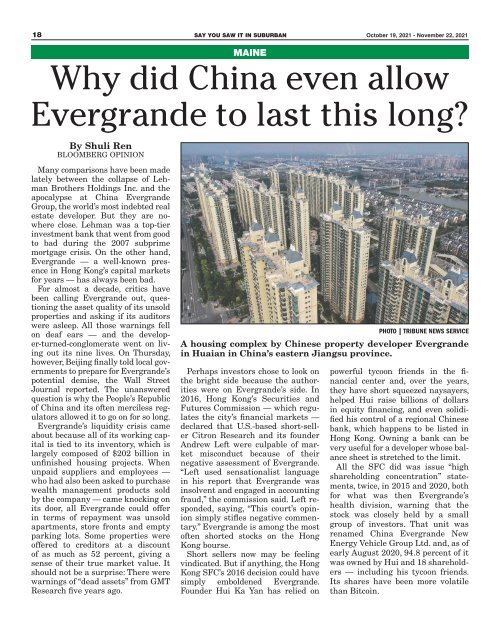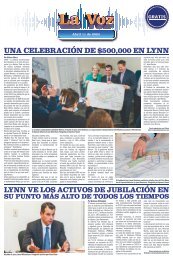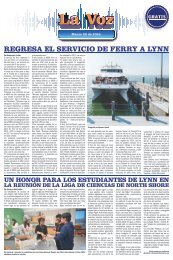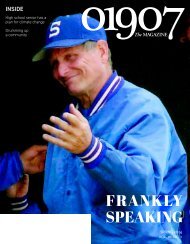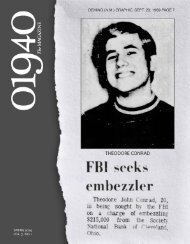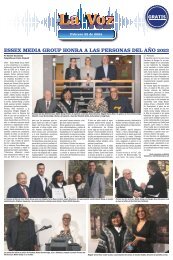Create successful ePaper yourself
Turn your PDF publications into a flip-book with our unique Google optimized e-Paper software.
18 SAY YOU SAW IT IN SUBURBAN October 19, 2021 - November 22, 2021<br />
MAINE<br />
Why did China even allow<br />
Evergrande to last this long?<br />
By Shuli Ren<br />
BLOOMBERG OPINION<br />
Many comparisons have been made<br />
lately between the collapse of Lehman<br />
Brothers Holdings Inc. and the<br />
apocalypse at China Evergrande<br />
Group, the world’s most indebted real<br />
estate developer. But they are nowhere<br />
close. Lehman was a top-tier<br />
investment bank that went from good<br />
to bad during the 2007 subprime<br />
mortgage crisis. On the other hand,<br />
Evergrande — a well-known presence<br />
in Hong Kong’s capital markets<br />
for years — has always been bad.<br />
For almost a decade, critics have<br />
been calling Evergrande out, questioning<br />
the asset quality of its unsold<br />
properties and asking if its auditors<br />
were asleep. All those warnings fell<br />
on deaf ears — and the developer-turned-conglomerate<br />
went on living<br />
out its nine lives. On Thursday,<br />
however, Beijing finally told local governments<br />
to prepare for Evergrande’s<br />
potential demise, the Wall Street<br />
Journal reported. The unanswered<br />
question is why the People’s Republic<br />
of China and its often merciless regulators<br />
allowed it to go on for so long.<br />
Evergrande’s liquidity crisis came<br />
about because all of its working capital<br />
is tied to its inventory, which is<br />
largely composed of $202 billion in<br />
unfinished housing projects. When<br />
unpaid suppliers and employees —<br />
who had also been asked to purchase<br />
wealth management products sold<br />
by the company — came knocking on<br />
its door, all Evergrande could offer<br />
in terms of repayment was unsold<br />
apartments, store fronts and empty<br />
parking lots. Some properties were<br />
offered to creditors at a discount<br />
of as much as 52 percent, giving a<br />
sense of their true market value. It<br />
should not be a surprise: There were<br />
warnings of “dead assets” from GMT<br />
Research five years ago.<br />
Perhaps investors chose to look on<br />
the bright side because the authorities<br />
were on Evergrande’s side. In<br />
2016, Hong Kong’s Securities and<br />
Futures Commission — which regulates<br />
the city’s financial markets —<br />
declared that U.S.-based short-seller<br />
Citron Research and its founder<br />
Andrew Left were culpable of market<br />
misconduct because of their<br />
negative assessment of Evergrande.<br />
“Left used sensationalist language<br />
in his report that Evergrande was<br />
insolvent and engaged in accounting<br />
fraud,” the commission said. Left responded,<br />
saying, “This court’s opinion<br />
simply stifles negative commentary.”<br />
Evergrande is among the most<br />
often shorted stocks on the Hong<br />
Kong bourse.<br />
Short sellers now may be feeling<br />
vindicated. But if anything, the Hong<br />
Kong SFC’s 2016 decision could have<br />
simply emboldened Evergrande.<br />
Founder Hui Ka Yan has relied on<br />
PHOTO | TRIBUNE NEWS SERVICE<br />
A housing complex by Chinese property developer Evergrande<br />
in Huaian in China’s eastern Jiangsu province.<br />
powerful tycoon friends in the financial<br />
center and, over the years,<br />
they have short squeezed naysayers,<br />
helped Hui raise billions of dollars<br />
in equity financing, and even solidified<br />
his control of a regional Chinese<br />
bank, which happens to be listed in<br />
Hong Kong. Owning a bank can be<br />
very useful for a developer whose balance<br />
sheet is stretched to the limit.<br />
All the SFC did was issue “high<br />
shareholding concentration” statements,<br />
twice, in 2015 and 2020, both<br />
for what was then Evergrande’s<br />
health division, warning that the<br />
stock was closely held by a small<br />
group of investors. That unit was<br />
renamed China Evergrande New<br />
Energy Vehicle Group Ltd. and, as of<br />
early August 2020, 94.8 percent of it<br />
was owned by Hui and 18 shareholders<br />
— including his tycoon friends.<br />
Its shares have been more volatile<br />
than Bitcoin.


